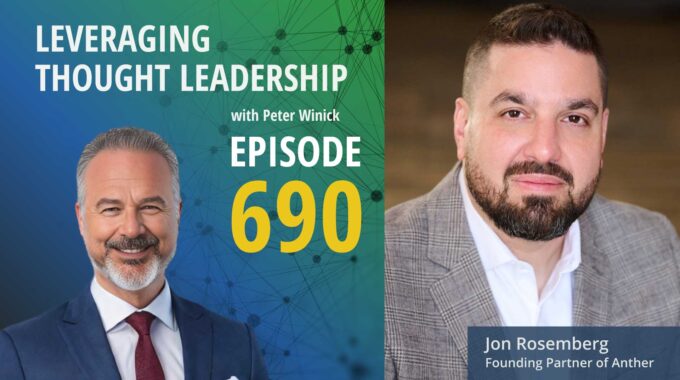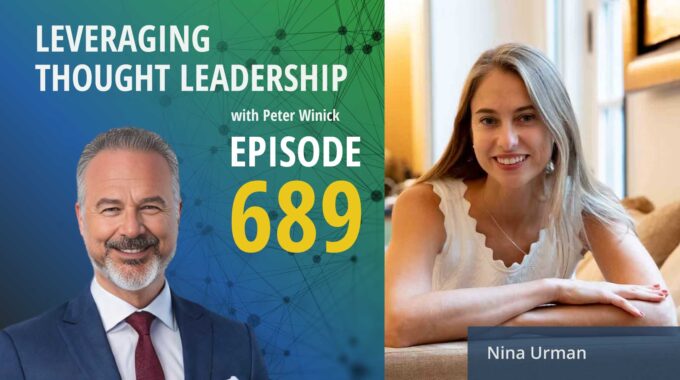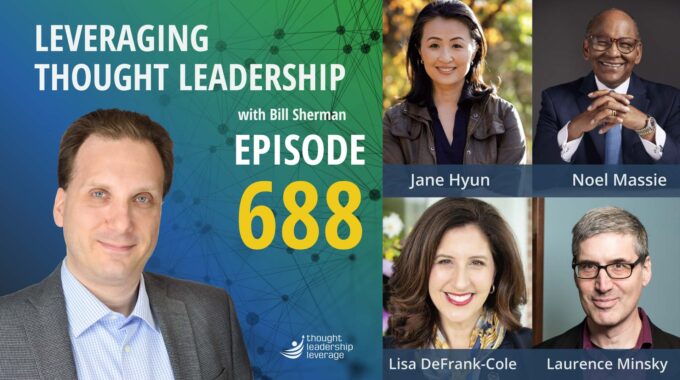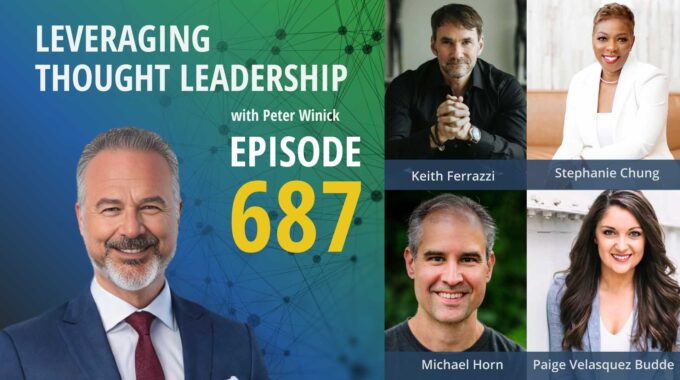A practical framework for leaders who want clarity and performance This episode defines thriving at…
The Two Sides of Being a Coach | Michael Wenderoth
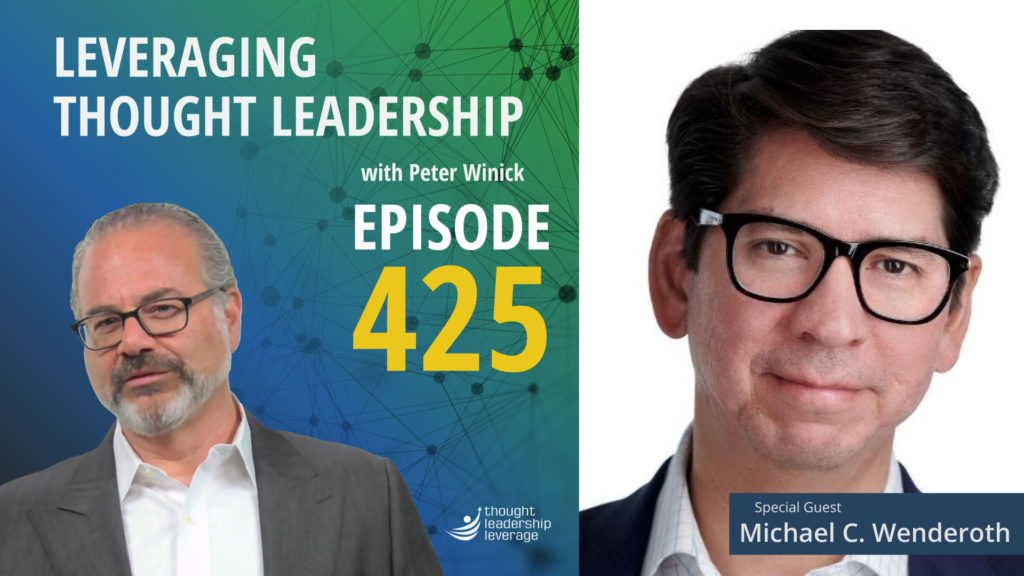
Managing the practice and the business of coaching.
An interview with Michael Wenderoth about helping people find and ethically leverage their power.
The words power, politics, and leverage typically have a negative connotation.
They bring to mind times when good people have been oppressed and mistreated.
But what if you could leverage power and politics ethically?
Michael Wenderoth is a speaker and executive coach who works one on one with leaders and executive teams, inspiring and teaching them to ethically leverage power and politics to get things done. Earlier this year, he authored Get Promoted: What You’re Really Missing at Work That’s Holding You Back, codifying his philosophies around thought leadership and morality.
In today’s chat, we examine power in the workplace; from the fundamentals to the uses of leverage. Too often, good people stand on the sidelines of leadership, afraid of the negative associations or power—and therefore, those people are not making a positive impact. Michael explains how power is simply the force needed to get things done. It’s not good, or bad, and it can be used to help others.
Michael has seen an increase in organizations wanting to shape the next generation of ethical and more diverse leadership. He shares how many people who are not used to being in a position of power or leadership can be ill-equipped to take the lead. Companies are investing in their future leaders by hiring coaches to help the next generation reach their full potential.
We discuss why launching a book takes years of investment, and talk more about navigating the two sides of a coaching business—doing the grunt work of business, and the amazing potential of coaching.
Three Key Takeaways:
- Power and politics in the office can be leveraged ethically to accelerate your career.
- Organizations wanting diverse leadership need to invest the time to train these potential leaders—but also accept that leadership can look different to many people.
- When working as a coach for a company, you need to be frank about the deliverable and how you will impact those you serve.
If you need a strategy to bring your thought leadership to market, Thought Leadership Leverage can assist you! Contact us for more information. In addition, we can help you implement marketing, research, and sales. Let us help you so you can devote yourself to what you do best.
Transcript
Peter Winick And welcome, welcome, welcome. This is. Peter Winick. I’m the founder and CEO at Thought Leadership Leverage and you’re joining us on the podcast today, which is Leveraging Thought Leadership. Today my guest is Michael Wenderoth, and Michael is a coach, Michael is an author, Michael is a speaker. Michael’s lots of things. So, without further ado, Michael, give us a quick snapshot of “Michael-world.”
Michael Wenderoth Sure. Peter, it’s a pleasure to be here. I’m an executive coach and I work one on one with leaders and executive teams, particularly around the area, around ethically leveraging power and politics to get things done. And I think that we’re in politics are an area that most people shy away with, but they’re absolutely the critical ingredients that you need as you’re rising in the ranks and to be very effective.
Peter Winick The three words that are usually not in the same sentence, which are which are ethical, leverage, and politics. So, I think what’s interesting is they actually exist in every organization. Right. But maybe we talk about it, maybe we don’t. So, what is unique about your perspective in terms of that ethically leveraging the power in the politics I can get with the unethical, but how does that converge?
Michael Wenderoth Yeah, so I mean, it is. It is. They’re like the air we breathe. And most people don’t want to talk about it because power, politics, you use leverage. It’s got all these negative associations and it has those negative associations because we see many leaders the examples of power amplified by the popular press, that power and politics are evil things to suppress, to destroy that narcissists use. When you really decompress this right. Power is nothing more than a force. And if we want to get things done, I mean, more good people, frankly, Peter, are on the sidelines. Right. A lot of good people who should be in leadership positions. They have this aversion to power and the associations of it. They’re frankly on the sidelines. They’re not making it.
Peter Winick And so, stay there for a minute. Stay there for a minute, because I think that’s a it’s 100% true. And I think in the world that we’re we have moved into or our moving into whatever where hybrid will probably be the default of see the future. But I think it’s fairly obvious, at least from where I sit, that the default is not Monday to Friday, 9 to 5, going to the office every day. For most people, most of the time. Right. So in a hybrid world. Right. I think there’s always been a population that said, I don’t want to get involved in the power. I don’t want involved in the politics. I’m just going to do good work. And it will be recognized in rainbows and unicorns and. Not that that’s not true, but it’s not as true as we’d like you to believe. Right.
Michael Wenderoth So I would say it’s not true at all.
Peter Winick Right. Okay. Well, I mean, some it’s yeah.
Michael Wenderoth You need hard work and talent to some degree, but there’s plenty of high rise in it. And that if you think about power and influence and politics, it is a differentiator that can help you even realize many of the things that you want to realize.
Peter Winick Right. And I think that the complexity or the compounding of the situation is – if the only time I see my boss, my teammate, my colleagues or my colleagues about a major story is on a Zoom call. Right. There’s not all those other opportunities. The hallway time, the window, the interactions, the lunch, the cocktails up, whatever. How do people that might have struggled with this before or you see them? Is it a bigger struggle now or how do you accomplish those objectives?
Michael Wenderoth I think this is a great question and it’s very interesting as we went into COVID and lockdowns and we were forced to interact through those mediums. You kind of saw two things emerge, right? You saw those who saw it as, holy crap. Right? This is a challenge of handcuffing me from doing having those side conversations. And there are those. And I think it’s what we’re always trying to do as coaches is to get them to see that as an opportunity. And in fact, you know, now we’ve been forced to operate in that. And those who said, well, how can I use this medium in new ways? And in creative ways. You now come out with a larger toolbox of things that you can use. Let me just give you an example. Actually, moving into that world has helped quite a few of the clients I’ve had who maybe were more introverted or didn’t have kind of a presence and weren’t allowed ones. And so suddenly, you know, we’re here in our zoom world. I can much more control the environment of how I’m showing up with you here, right? Because of the lighting, etc… I might even have something on my screen. Right, right. Posted it up there. That’s framing exactly how I want to say things which I can’t do if I’m in person. And if we know that like, presence and how you show up matters. This actually works to the favor of certain people who might be overlooked in organizations. And it also allows kind of spanning kind of boundaries, right? Because we’re not having all those meetings or around the watercooler. So there seem to be this allowance for just sometimes reaching out to people.
Peter Winick Yeah. So I think therefore one would need to be more deliberate and intentional meaning hey, if the culture at my organization or the rules or whatever is, we go into the office either a set times of, you know, I’m a Tuesday Thursday guy, you’re a Monday, Wednesday or whatever or at my discretion on an as needed basis. If you could do 80% of your work from home, great. Whatever. But I think what we need to do is be more deliberate. Okay, if I’m going to make the trek into the office, whether that’s a block from my home or 2 hours, I shouldn’t be doing the things in the office that I could easily be done at home, if that’s the only time, once a month where Michael and I are in the same building. I need to find a reason for you and I to sit down and have a cup of coffee. Right. And I think this this sense of agenda-lessness, if that’s the thing, has been evaporating because every Zoom meeting, you know, even when we had face to face meetings all the time, you get to the meeting room 5 minutes before, hey, Mike, I was a week ago. It’s like, you know, whatever, that stuff or you know what? I need to grab you for 2 minutes after this thing to talk about the Kelly File or whatever it is. Yeah, we’re so agendaed and we can’t veer from it because we can’t do this side chatter in a meeting of 12 people. So, I think you have to be more intentional and understand where that power is.
Michael Wenderoth Yeah, and I think that’s the name of the game. And you know, regardless and then this for stuff, right? I’m a big fan of it. Did a lot of work in innovation that constraints actually get us to think creatively, yet how we do certain things and absolutely being intentional. Right. You know, if choose the day that you go in. Right. So you are in conversation with people or you can make certain things happen and you have to start creatively. Think about right. We all know about the meeting before the meeting. We all know about the things that that influence. And I think that is part of your job to be doing those things. That’s going to make you more efficient. Right. I mean, a lot is not getting done in organizations. We’re in many meetings that make no sense because it’s just based on. Yeah. And so, the more strategic and intentional we get, the better.
Peter Winick So I want to move now. So that’s I love that because it’s so topical and so time and some people struggle with that. Talk about your business model. So you made a clip. Coach Right. So what? What opportunities have opened up for you and what’s been different in terms of the way you practice, the way you charge for your services, the way you find clients, and what’s the same and what’s different? What same and different because of COVID or because of just the last couple of years. Right. So this isn’t like, oh, it was a snow day. We had a long weekend, then we just automatically go back. Everyone I think, has gone through. Whether voluntary or involuntary or reactive or proactive business transformation. Yeah. Right. So. So I guess as a coach, which is a fairly standard business model, you have clients, you serve your clients, and you think, whatever. What’s the same and what’s different? To what degree have things change for the better?
Michael Wenderoth Yeah. So, I would say, you know, I have I serve clients all over the world and I have primarily at the beginning done remote coaching. And I was doing video six years ago as the primary mechanism. And so, it was one of the things when COVID kind of hit, more of the industry moved in that area. So, it kind of forced me to continue to up my game in terms of things that I could offer to clients. But I would say that whenever there’s that crisis, it creates this this need. And people were frustrated.
Peter Winick Yeah, scared.
Michael Wenderoth How to get things done and they were looking for answers. So kind of being able to tap and coach people around that. It’s also brought in this area of how can I serve more clients? The idea of kind of scalability, which is part of the reason why I wrote the book. So, to get kind of that message out there and started doing in certain settings, group coaching, enabling that. But also, and I think this is the part I started very much. Correct with clients and they would come to me. So, I wasn’t working necessarily through the organizations and where they let me.
Peter Winick Meaning that the clients were personally engaging you to solve whatever struggles they have. And now it’s the organization paying the bills. So, does that change the responsibility, the context, the what does that change in terms of the dynamic or the outcomes?
Michael Wenderoth Yeah. So, it creates more complexity of a kind of who you’re reporting into, right? The companies trying to build the client. So ultimately, is there alignment around what the goals are? But also, as a coach, how you kind of manage that dynamic.
Peter Winick And then you have to set those expectations upfront like, these are my roles as a coach. Absolutely. Even though you’re paying the bills, these are you know, this is where the line is between what happened and, you know, what happens in the session is sacred.
Michael Wenderoth And that’s exactly especially why a lot of them want report outs. They want to know what this work. But a lot of them and I think this is the other piece we can call it COVID, which also coincided with a lot of things kind of societally that shift this.
Peter Winick Sure.
Michael Wenderoth So there was a, this is the other kind of big shift that’s affected my business, is that there is this recognition that we want to get larger, diverse group of people to the top. And we know that women, minorities or talk in the US context. I’ll just use those words for simplicity. We want to see more of those leaders. And so organizations have taken it upon themselves as we see these leaders. And they may need to make some adjustments, right. Of how they navigate power because they’re traditionally having less power. And so that’s another area that has come to me where a company will engage and say, “We’d like you to work with this individual.” They have huge potential. There may be one or two things that they need to adjust to that will take them into the upper levels that we want to see from them, how they show up, how they’re kind of leading.
Peter Winick So this is a population that might not have gotten access to coaching in these types of services before, because there’s a greater level of awareness from a talent development talent pipeline like, oh, if we want leaders, you can’t just wake up on a Monday and say, okay, voila, you’re leaders. I haven’t been preparing you for that.
Michael Wenderoth Yeah, absolutely. And I think that’s. That’s been huge. So a lot of companies have come with that agenda. There is that part, this trickiness navigating, too, because I will say some organizations and some leaders, we know this. They want to see individuals who look like them. Right. Whether that’s good or.
Peter Winick Whether they say it or not. Yeah, yeah, yeah.
Michael Wenderoth And so you have to kind of navigate. Right. What is the expectation of what leadership looks like here? Are you willing to accept that there’s different models of leadership? So, some of this is there’s some coaching that goes on right of that executive who’s the sponsor as well. So, there’s some pieces that you have to navigate.
Peter Winick And you’re not. I just want to clarify. And when you say looks like you’re not talking about from a diversity perspective, it more meaning behavior.
Michael Wenderoth Exactly. Exactly. So, if we want to just take this to an extreme, right, you know. All of my reports need to look decisive and show up. And so, they may see that in a very like.
Peter Winick Competent, outgoing way.
Michael Wenderoth So we know confidence is important, need to show that there may be nuances around that. And also, part of that is getting the executive being coached to flex. Part of that may be getting the executive, the sponsor to flex in terms of what they may see the range of. What is confidence look like.
Peter Winick Got it. Right. So, here’s a different way that confidence manifests and might not be the way that you’re familiar with. But here’s how that works. Cool.
Michael Wenderoth Yeah.
Peter Winick If you’re enjoying this episode of Leveraging Thought Leadership, please make sure to subscribe. If you’d like to help spread the word about our podcast, please leave us a review and share it with your friends. We’re available on Apple Podcasts and on all major listening apps as well as at ThoughtLeadershipLeverage.com/podcasts.
Peter Winick So I want to touch on – you mentioned the book, right? So, share with us your experience of deciding to write the book, writing the book, and now we’re on the other side of that journey. The book’s been out there and what expectations have been met and what might you have done differently or coached others to do that are in some phase of that journey?
Michael Wenderoth Yeah. You know, I strongly believe that we wear two hats as coaches. Right there is the practice of coaching and there’s the business of coaching. And I think we, you know, if we are running a business and that is what I’m doing, you need to be frank about there’s the two parts there of what you’re delivering and then the whole business side of it and.
Peter Winick The business side being the branding, the marketing, the positioning, the pricing, the all this stuff that most coaches get into the business to do the work, but they don’t understand well enough how to get the work in. So they have the privilege of doing the work that you want to do.
Michael Wenderoth Yeah. So if you’re a great coach and you’re not serving anyone or you’re not serving people, you know, who have impact or so forth. I don’t believe you’re also serving.
Peter Winick Right, right, right, right.
Michael Wenderoth Clients. And so the book spanned both of those sides. You know, one of them is is the piece of art of helping me. My way of processing the world is I write I share that out here is to break down the process and to put that out there that I help people who are frustrated, who hit glass ceilings, kind of work through very difficult internal things of how do I feel about power and kind of move that and use and leverage it to help them, their causes, etc., whether that’s getting promoted, making an impact. So the book was both the process of helping me put out there.
Peter Winick That’s a forcing mechanism to get you to codify the stuff that you might not have documented that has been rattling around in your head and impermanence as well.
Michael Wenderoth So it’s a clear process of codifying it. And to me, it’s also I’m not an academic. I am a coach who leverages academic research, is to then put that also in the words that resonate with people that speak to people, my clients.
Peter Winick And so when people look at the book prior to reaching out to you or hiring you, they’re also getting a sense of what to expect. Right? Your style, you’re telling them, I mean, the process is the process, right. So, it’s really documented. It’s not going to be surprises where you’re going to take them through. But the voice, the style, and they can go, that seems like it’s for me or not interested and either are okay.
Michael Wenderoth Yeah. And so yeah. So, it’s the process. It’s also my philosophy, right? This is my area and I like to tell them if you read my book and you throw up about power and how my views on it and how I work with people, then you know, then you’re not a fit for me, right?
Peter Winick Yeah.
Michael Wenderoth You’re not the fit for me. And so, it is a mechanism if we now shift more frankly and I know you’re in this area as well, that we talk about this on the business side, which is to say it creates branding and puts myself out there as here’s my philosophy, here’s what I do. And it is a mechanism by which people get to know me. They kind of self-select in terms of this resonates with me and it brings me clients as well who I would otherwise not always be able to serve. And quite a few of them may read it now, get pieces out of it, but they’re on their journey and so it lodges with them, right? This is the guy who had a very particular message. He felt most of the leadership literature, literature is long, is misguided. And he has view on power, a thesis here that absolutely resonated. And there’s a trigger moment three years down the road. And I’ve had this happen. The book is – still we’re still in the infancy of it, but it comes.
Peter Winick Yeah. Excellent, excellent. So last question. With regards to the book, from a r y standpoint, a lot of folks go into the book and if the only benefit you got out of the book is contemplating it. I would argue that’s probably enough of a benefit, right? But now you’re looking at it from a you talk about the business side of coaching. Have you been able to quantify like as a result of spending X dollars X amount of my time? Here’s the investment I made six months of my time and X dollars of whatever. And directly attributable to that or I brought on x new clients that represent y dollars and can see that pattern continuing over the next 5 to 7 years. If you got to that sort of ROI metric.
Michael Wenderoth Yep. Yes. I mean, I’m not going to share numbers here.
Peter Winick No, no, no, I’m not saying.
Michael Wenderoth But I mean, yeah, I’m very clear about that was one of the primary goals in the book. There is that part around helping people and getting the message out there. But, you know, you can do the math right in terms of your time and the amount to put this together. How many incremental clients who wouldn’t otherwise come are coming for me? That has happened right away. And so, the question to and the way I design the book is, you know, it’s evergreen. This is a problem that is not going to go away either. Right. This this is you know, and so I view marketing as kind of a long-term view. The book launch is not a month. This is a three-year process. And so that message being out there that more people hearing it builds your brand in the market and brings clients back. So, I can see how many books are moving a day. People who come into my site, those are certain metrics I look at. And then obviously the ideal one is where people who are. They don’t always exclusively coming because of the book. We can never totally measure that. But I’d say we have some position on that. Right, because I know picked it up and downloaded it.
Peter Winick Right. They’re touching it. And you can see what geographies and all that. Cool, cool. So any last words of wisdom?
Michael Wenderoth Well, I mean, I think in the area that you’re in around thought leadership is one that more coaches, if they want to make an impact, they need to be thinking about. And to me it’s that got to where the two sides. Right. The practice of your coaching and then the business side of it. You know if you’re you this is running a business, not a side hobby or more.
Peter Winick Yeah.
Michael Wenderoth And I, you know, I can quantify this too, in my area, Peter. Right. In terms of what are my clients gain when they get promoted, certainly that’s a very easily measurable economic impact.
Peter Winick Yeah, of course. That’s interesting. Well, great stuff. I appreciate you coming on today. I appreciate your time and thank you for joining with us. Thanks, Michael.
Michael Wenderoth Absolutely. Pleasure.
Peter Winick To learn more about Thought Leadership Leverage, please visit our Web site at ThoughtLeadershipLeverage.com to reach me directly. Feel free to email me at Peter at Thought Leadership Leverage dot com and please subscribe to leveraging Thought Leadership on iTunes or your favorite. Podcast app to get your weekly episode automatically.



